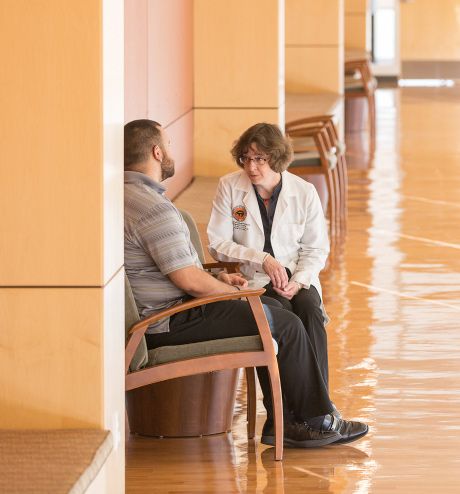 March has been National Colorectal Awareness Month since 2000. Colon and rectal cancers combined are the fourth most common cancers in the United States, and they are also the second deadliest cancer for both men and women in this country.
March has been National Colorectal Awareness Month since 2000. Colon and rectal cancers combined are the fourth most common cancers in the United States, and they are also the second deadliest cancer for both men and women in this country.
The American Cancer Society expects there to be over 135,000 new cases this year, and over 50,000 people will die from these diseases.
Colon cancer occurs when polyps, or small growths of cells, form tumors inside the colon (also known as the large intestine), with the last five to 10 inches of the colon being the rectum.
Where the cancer first forms is the main distinction between colon and rectal cancer, and the term “colorectal cancer” is commonly used to describe both.
We sat down with Vi Kien Chiu, MD, leader of the Gastrointestinal Team at the UNM Comprehensive Cancer Center, to ask him about risks, symptoms and research advances in colorectal cancer.
What are some symptoms of possible colorectal cancer?
Blood in your stool would be concerning, as is abdominal pain that doesn’t go away. Rectal bleeding and pencil-thin stools (because it has to pass an obstructing mass in the colon) could also be signs. Weight loss for no discernable reason is kind of a later warning sign. If you take a blood test and you are found to have iron deficiency anemia or your hemoglobin or red blood cell count is low, that can also be a warning sign. Constipation can be a bigger issue in rectal cancer than with colon cancer.
According to the American Cancer Society, over 60 percent of deaths from colorectal cancer could be avoided with proper screening. At what age should people get screened for colorectal cancer?
Fifty years old is generally the guideline. But if you have concerning symptoms or if you have a family history, then you should get screened earlier than that. If you have an immediate family member who has or had colorectal cancer, then you should get screened 10 years younger than when they were when they were diagnosed.
We are also finding increased incidences of cancer in younger patients. If you have a concerning family history then you should definitely get genetic testing and be seen by a genetic counselor. Early detection is key for colorectal cancer.
Who is at an elevated risk for colorectal cancer?
The development of cancer is a dynamic between your genes and your lifestyle. Those two things play an important role.
If you’re on a fatty diet, or one rich in red meat, that will put you at an increased risk. There is also an associated risk with smoking. Your overall health and how much you exercise also factors in. Obesity puts you at risk, and lack of exercise is a risk factor.
What can people do to reduce their risk of getting colorectal cancer?
As people age, the risk of cancer increases so a healthy diet and exercise become even more important as people grow older. I also tell my patients to eat things with antioxidant properties like fruits, but to avoid taking pills with high antioxidant qualities because those can be harmful.
What type of research is the UNM Comprehensive Cancer Center doing regarding colorectal cancer?
One of the things we are addressing is treating people with a poor prognosis because their tumor has spread. What we have found is that if the cancer has spread to a limited number of other sites, an estimated 20 percent of patients can theoretically still be cured. For example, if I have a patient with cancer that has spread to the liver or to a small section of the lung, it can be resected and those people can be cured.
There is also a lot of excitement about immunotherapy in colorectal cancer. Patients with a defect in their mismatch repair ability have a very high response to immunotherapy. Typically, this only exists in about four or five percent of patients.
For the predominant 95 percent of the population that doesn’t have the mismatch repair defect and don’t respond to immunotherapy, we’re looking at whether we can combine immunotherapy with another agent, like a targeted therapy, that may have efficacy.
We are also looking at the idea of inhibiting stem cell programming that might limit cancer cell reproduction. We are actually looking at opening trials that may target the stem cell pathway. Some stem cells have a role in the initiation of cancer cells, and then later in the duplication of those cells, but that role is currently undefined. This trial will help define what that role is in the later stage.
Do you have any final thoughts?
This is a cancer that is very treatable. People should get screened. There is a lot of research activity ongoing looking at new options. On an individual level, maintaining a healthy lifestyle will play a strong role in helping to prevent cancer.

